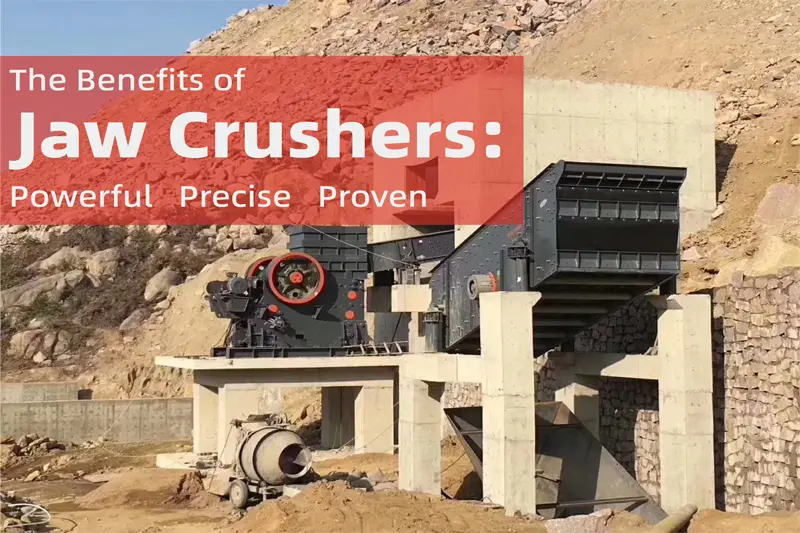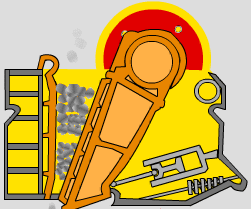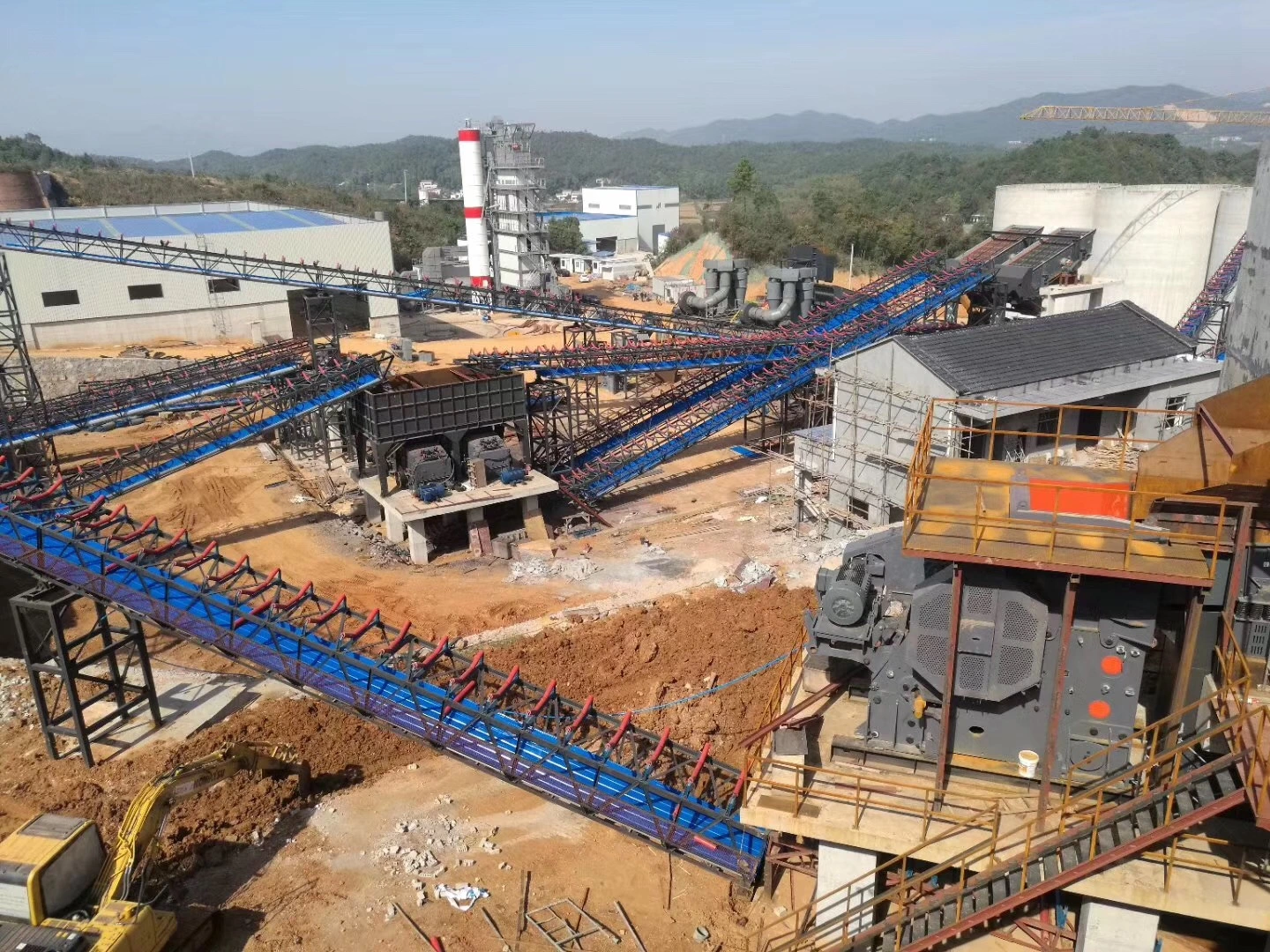
When choosing the right crusher for your operation, understanding how each type functions and its unique advantages is essential for optimizing efficiency and minimizing costs. In this article, we will dive deep into the jaw crusher, exploring why it remains a preferred choice across various industries, particularly when compared to other crushers like cone and impact crushers.
The jaw crusher operates on a simple yet powerful principle of compression. The material is fed into a large feed opening, where two jaws—one fixed and the other movable—create a crushing action. The movable jaw moves in a back-and-forth motion, crushing the material against the stationary jaw. This compression effectively reduces the size of the material.
Compared to other crushers like the cone crusher, which operates by compressing and squeezing materials between a cone and a concave surface, or the impact crusher, which relies on high-speed impact to break down materials, the jaw crusher is particularly efficient at handling large, coarse materials. It is especially suited for primary crushing applications, where the material size is large and needs to be reduced significantly.

The jaw crusher is known for its remarkable performance in handling tough and high-compression strength materials. Whether you’re dealing with hard ores, construction debris, or large rocks, the jaw crusher is designed to provide efficient and powerful crushing action, making it ideal for primary crushing in mining, construction, and demolition.
One of the key performance advantages of the jaw crusher is its ability to handle a wide variety of material types, including hard rock, recycled concrete, and even some non-metallic ores. Its high crushing ratio—often up to 6:1—means that the crusher can reduce the size of material in fewer passes, maximizing productivity. The jaw crusher also provides excellent control over the final product size, making it an ideal choice for projects requiring specific material specifications.
Additionally, the jaw crusher typically has a longer service life compared to other crushers. With fewer moving parts, it is less prone to mechanical breakdowns, leading to lower maintenance costs and higher uptime.
Maintenance and Operational Costs
The jaw crusher is often chosen for its low operational and maintenance costs. One of the main advantages of this crusher type is its simplicity. With fewer parts to wear out or break, maintenance procedures are more straightforward and less frequent. The jaw crusher’s robust design means it can handle harsh conditions with minimal downtime, reducing the cost of repairs and the need for specialized maintenance teams.
In terms of operational costs, the jaw crusher offers excellent value, especially for long-term projects. Its efficient power usage and reliable design help reduce energy consumption and operational overhead, making it an economically viable option for many businesses, particularly in large-scale or heavy-duty operations.
One of the standout features of the jaw crusher is its high crushing ratio. In fact, the crusher is known to deliver a reduction ratio between 3:1 and 6:1, depending on the material being processed. This means that large volumes of material can be efficiently processed in a short time.
Compared to cone crushers or impact crushers, which may struggle with high-volume or coarse materials, the jaw crusher excels in handling larger feed sizes, making it ideal for primary crushing. Additionally, the jaw crusher allows for better control over the product’s output size, ensuring that materials meet the necessary specifications for further processing.
For operations that require large-scale production or precise material specifications, the jaw crusher is an ideal choice. It provides consistent, high output and is adaptable to different material types, making it a versatile solution for various industries.
Versatility and Range of Applications

The jaw crusher is incredibly versatile and can be used in a variety of industries, including mining, construction, demolition, and recycling. Whether you're working with hard ores, rocks, or even recycled concrete, the jaw crusher is capable of handling diverse materials with ease.
For example, in the mining industry, the jaw crusher is often used as the primary crusher for ores and minerals. In construction, it is employed to break down large pieces of concrete, asphalt, and other building materials. Additionally, the jaw crusher is an essential piece of equipment for recycling operations, where it helps break down old concrete or asphalt for reuse.
Compared to other crushers like cone or impact crushers, which are more specialized for secondary or tertiary crushing, the jaw crusher offers a broader range of applications, making it suitable for a wider variety of projects.
Environmental Benefits and Energy Efficiency
As industries worldwide move toward more sustainable practices, the jaw crusher offers distinct environmental advantages. One of the key benefits of the jaw crusher is its energy efficiency. The machine is designed to consume less power than many other crushers, making it a more eco-friendly option.
In addition to lower energy consumption, the crusher’s simple design also leads to less waste generation during the crushing process. Since it’s less complex than other crushers, it requires fewer materials to construct and maintain, contributing to its lower environmental impact over its lifespan.
The crusher’s ability to process a wide variety of materials without excessive energy consumption or emissions helps companies meet both environmental regulations and sustainability goals, while still delivering high performance.
Safety is a critical consideration in any heavy-duty operation, and the jaw crusher excels in providing a safe working environment. The crusher’s design, with fewer moving parts compared to other machines, reduces the risk of accidents. Additionally, many modern jaw crushers come with enhanced safety features, such as protective shields, emergency shutdown systems, and fail-safe mechanisms to protect both operators and equipment.
In comparison, other crushers like impact crushers or cone crushers often involve more complex mechanisms, which can pose higher risks during operation. The jaw crusher’s simple, stable design makes it easier to operate in heavy-duty environments, providing peace of mind for operators and minimizing the chance of mechanical failure.
Technological Advancements in Jaw Crushers
Like many modern machines, the jaw crusher has benefited from advancements in technology. New innovations, such as automated systems, smart sensors, and remote monitoring, have significantly improved the efficiency, reliability, and ease of operation of the jaw crusher.
For example, some of the latest models come equipped with diagnostic systems that alert operators to potential issues before they become serious problems. This predictive maintenance feature can prevent downtime and costly repairs by addressing issues early. Additionally, the integration of smart technology allows for better optimization of the crushing process, ensuring that the machine operates at peak efficiency.
These technological improvements make the jaw crusher not only more reliable but also more efficient, offering significant benefits in both operational cost and productivity.
The jaw crusher is highly customizable, allowing businesses to tailor the machine to their specific needs. Depending on the material being processed, operators can choose different jaw configurations, such as variations in the size and shape of the jaws, to optimize performance.
For operations with unique material handling requirements, the jaw crusher can be adjusted to meet specific goals, whether that involves achieving a particular size reduction or improving throughput. This level of flexibility allows the jaw crusher to be used in a wide variety of applications and industries.
Whether you need a high-capacity machine for a large-scale project or a more compact unit for a smaller operation, the jaw crusher can be customized to meet your specific needs, making it an adaptable and reliable solution for different types of crushing applications.
The jaw crusher continues to be a top choice for many industries due to its simplicity, efficiency, and versatility. From its powerful performance in crushing hard materials to its low maintenance and operational costs, the jaw crusher provides excellent value for both short-term and long-term operations.
Whether you need a crusher for primary mining operations, demolition, recycling, or construction, the jaw crusher offers a reliable and efficient solution. Its wide range of applications, energy efficiency, and safety features make it an ideal choice for many businesses looking to maximize productivity and minimize operational costs. By choosing the jaw crusher, you are investing in a machine that provides exceptional performance, durability, and flexibility for any crushing task.